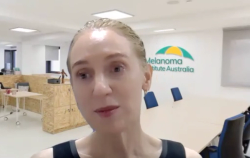Communication Between Patients, Doctors Crucial After Melanoma Surgery
Patients with melanoma play a vital role in their own post-surgical care, as one expert from Dana-Farber Cancer Institute explained to CURE®.
Patients with melanoma play a vital role in their own post-surgical care, as one expert explained to CURE®.
“Patients that are coming to see us, once they have (received) a diagnosis of melanoma, they are often very concerned, especially when they learn about the disease and how aggressive it can be,” Dr. Justine V. Cohen, a medical oncologist with Dana-Farber Cancer Institute in Boston, said. “And so, they want to follow up and they want to be seen.”
The provider’s goal, Cohen explained, is to detect any post-surgical recurrence of melanoma as early as possible. The stage of a patient’s disease can provide valuable insight into potential recurrence risk, because, as Cohen explained, “then we can devise a good plan for that patient, how often they need to come back, do they need scans, do they just need a history and physical, how often they should be checking their blood work, etc.”
“Patients should feel empowered to ask about their stage of melanoma,” Cohen said. “And the reason why is because they need to know the risk of recurrence. Because when we know the risk of recurrence, we can say, ‘Well, this is what this is what's likely to happen’ or ‘This is what's not likely to happen.’ So, when patients understand their stage, they understand what their risk is, and they know how often to follow up with their doctor.”
LEARN MORE: Why Melanoma May Need Treatment After Surgery
The provider’s four standard means of detecting melanoma recurrence, as Cohen explained, are asking the patient if they are experiencing symptoms (such as detecting lumps or bumps, fatigue or generalized symptoms such as a lack of appetite), examining the patient, conducting scans and bloodwork analysis.
Cohen cited a study, published in 2008 in the journal Annals of Surgical Oncology that, as she said, “showed that patients actually detect recurrences better than the other three methods that we have.”
Researchers, writing in Annals of Surgical Oncology, found that “more than half of melanoma recurrences are self-detected; these patients have the most favorable post-recurrence survival rates because of the type of recurrence detected. The mode of detection is a significant predictor of post-recurrence survival.”
LEARN MORE: FDA OKs Trial of TIL Therapy KSQ-001EX in Skin, Head and Neck and Lung Cancers
“It's really important for patients to have very open lines of communication with their doctors,” Cohen said. “Because if we don't see patients (often), let's say we see a patient once every six months, that's a long time to go between visits and so we rely on patients calling us if new things pop up between those (visits every) six months. So, I always tell patients to call me (and) that I want to know if they're developing any strange symptoms, like they're losing weight unintentionally or they're more fatigued than usual or they have unusual lumps anywhere, any sort of issues. I want to know about that.”
LEARN MORE: FDA Approves Opdivo for Post-Surgical Stage 2B or 2C Melanoma
For more news on cancer updates, research and education, don’t forget to subscribe to CURE®’s newsletters here.
Related Content
 Understanding Adjuvant and Neoadjuvant Melanoma Treatment
Understanding Adjuvant and Neoadjuvant Melanoma TreatmentFebruary 18th 2024
 Experts Give an Overview of the Latest Melanoma Therapies
Experts Give an Overview of the Latest Melanoma TherapiesFebruary 15th 2024
 What’s the Plan for Patients With Melanoma After Surgery?
What’s the Plan for Patients With Melanoma After Surgery?January 10th 2024
 Why Melanoma May Need Treatment After Surgery
Why Melanoma May Need Treatment After SurgeryNovember 15th 2023
 Solid Cancer Approvals from Summer 2023
Solid Cancer Approvals from Summer 2023September 1st 2023
 Types of Skin Cancer and Their Treatments
Types of Skin Cancer and Their TreatmentsAugust 10th 2023
View additional resources on CureToday.com



